| |
Date |
Event(s) |
| 1 | 1642 | - 25 Dec 1642—20 Mar 1727: Sir Isaac Newton is born
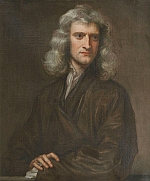
Physicist, mathematician and inventor. Laid the foundation of classical mechanics, which formed the basis of physical science until Einstein. Formulated universal laws of motion and the law of universal gravitation. Demonstrated how these laws explained both the motion of planets and comets and objects on Earth. Invented a form of the calculus. Invented the first practical reflecting telescope. Proposed that Earth was an oblate spheroid. Calculated the speed of sound.
|
| 2 | 1665 | - 1665—1666: Great Plague of London
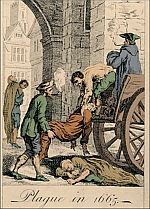
The Great Plague of London, lasting from 1665 to 1666, was the last major epidemic of the bubonic plague to occur in England. It happened within the centuries-long Second Pandemic, a period of intermittent bubonic plague epidemics that originated in Central Asia in 1331 (the first year of the Black Death), and included related diseases such as pneumonic plague and septicemic plague, which lasted until 1750.
The Great Plague killed an estimated 100,000 people—almost a quarter of London's population—in 18 months.
|
| 3 | 1675 | - 20 Jun 1675—12 Apr 1678: King Philip's War
King Philip's War (sometimes called the First Indian War, Metacom's War, Metacomet's War, Pometacomet's Rebellion, or Metacom's Rebellion) was an armed conflict in 1675–1676 between indigenous inhabitants of New England and New England colonists and their indigenous allies. The war is named for Metacom, the Wampanoag chief who adopted the name Philip because of the friendly relations between his father Massasoit and the Mayflower Pilgrims. The war continued in the most northern reaches of New England until the signing of the Treaty of Casco Bay on April 12, 1678.
The war was the greatest calamity in seventeenth-century New England and is considered by many to be the deadliest war in Colonial American history. In the space of little more than a year, 12 of the region's towns were destroyed and many more were damaged, the economy of Plymouth and Rhode Island Colonies was all but ruined and their population was decimated, losing one-tenth of all men available for military service. More than half of New England's towns were attacked by Natives. Hundreds of Wampanoags and their allies were publicly executed or enslaved, and the Wampanoags were left effectively landless.
|
| 4 | 1685 | - 2 Jun 1685: Plymouth Colony Splits Into 3 Counties
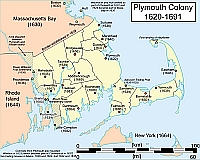
Plymouth Colony splits into three separate counties:
- Plymouth
- Barnstable
- Bristol
In 1691 they join the Massachusetts Bay Colony. Click on the image, which shows the year the cities were formed in the Colony through 1686.
|
| 5 | 1703 | - 22 Jun 1703: Newport County, Rhode Island is Created
Newport County, Rhode Island was created on June 22, 1703 as an Original County. The county was named for the town (now city) of Newport, Wales.
|
| 6 | 1706 | - 17 Jan 1706—17 Apr 1790: Benjamin Franklin is born
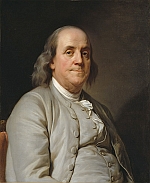
Benjamin Franklin was an American polymath who was active as a writer, scientist, inventor, statesman, diplomat, printer, publisher, forger and political philosopher. Among the leading intellectuals of his time, Franklin was one of the Founding Fathers of the United States, a drafter and signer of the United States Declaration of Independence, and the first United States Postmaster General.
|
| 7 | 1773 | - 16 Dec 1773: Boston Tea Party
The Boston Tea Party was an American political and mercantile protest by the Sons of Liberty in Boston, Massachusetts, on December 16, 1773. The target was the Tea Act of May 10, 1773, which allowed the British East India Company to sell tea from China in American colonies without paying taxes apart from those imposed by the Townshend Acts. The Sons of Liberty strongly opposed the taxes in the Townshend Act as a violation of their rights. Protesters, some disguised as Indigenous Americans, destroyed an entire shipment of tea sent by the East India Company.
|
| 8 | 1775 | - 1775: The Flush Toilet is Invented
In 1775 Scottish inventor Alexander Cumming was granted the first patent for a flush toilet. His greatest innovation was the S-shaped pipe below the bowl that used water to create a seal preventing sewer gas from entering through the toilet.
- 19 Apr 1775—3 Sep 1783: American Revolutionary War
The American Revolutionary War, also known as the Revolutionary War or American War of Independence, was a major war of the American Revolution. Widely considered as the war that secured the independence of the United States, fighting began on April 19, 1775, followed by the Lee Resolution on July 2, 1776, and the Declaration of Independence on July 4, 1776. The American Patriots were supported by the Kingdom of France and, to a lesser extent, the Kingdom of Spain and the Dutch Republic, in a conflict taking place in North America, the Caribbean, and the Atlantic Ocean.
|
| 9 | 1776 | - 4 Jul 1776: The United States Declaration of Independence is signed
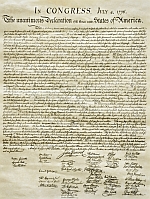
The United States Declaration of Independence, officially The unanimous Declaration of the thirteen united States of America, is the pronouncement and founding document adopted by the Second Continental Congress meeting at Pennsylvania State House, which was later renamed Independence Hall, in Philadelphia, Pennsylvania, on July 4, 1776. Enacted during the American Revolution, the Declaration explains why the Thirteen Colonies at war with the Kingdom of Great Britain regarded themselves as thirteen independent sovereign states and no longer subject to British colonial rule. With the Declaration, the 13 states took a collective first step in forming the United States and, de facto, formalized the American Revolutionary War, which had been ongoing since April 1775.
|
